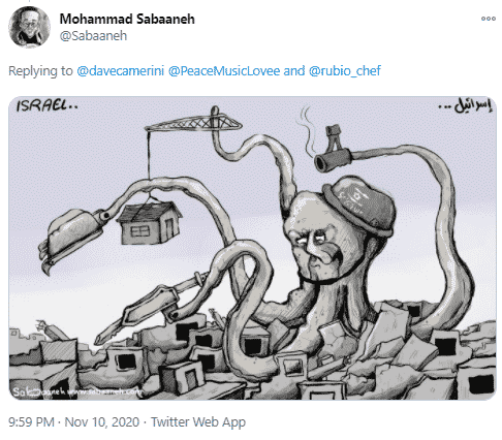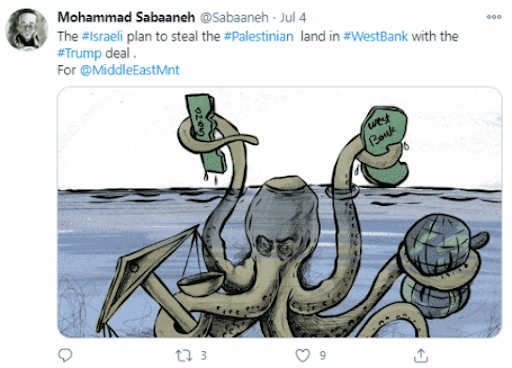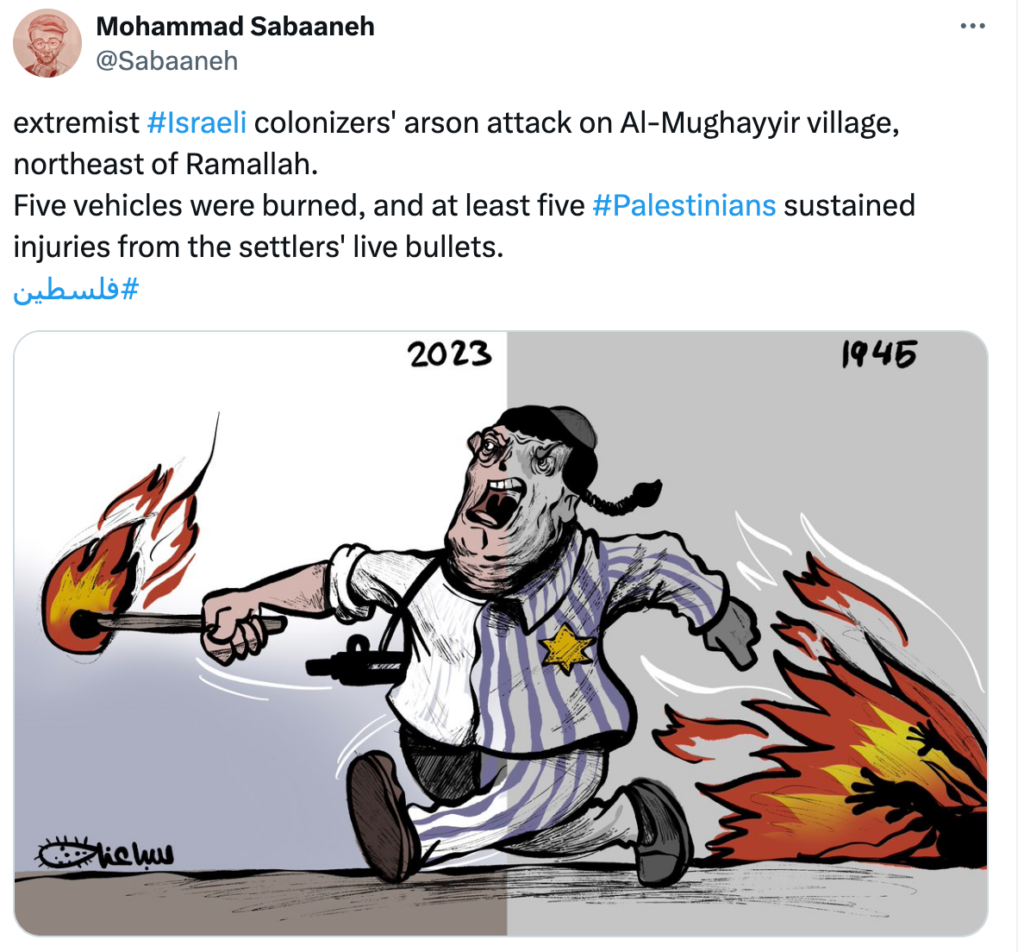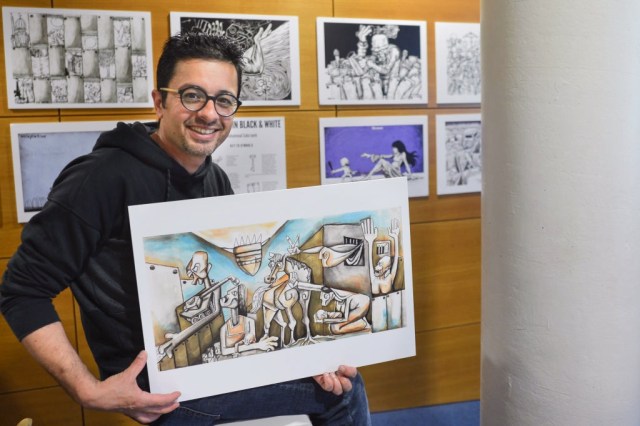Palestinian artist and award-winning political cartoonist, Mohammad Sabaaneh, during the ‘Art & Resistance in Palestine’ event hosted by Trinity BDS Campaign and Trinity College Students’ Union. On Friday, March 29, 2019, in Dublin, Ireland. (Photo by Artur Widak/NurPhoto)

Promising “kick-ass superheroes, future worlds, fantastical creatures and zombies”, the Lakes International Comic Art Festival (LICAF), should begin next weekend in Cumbria. Yet a row about a Palestinian artist accused of antisemitism threatens to derail the prestigious graphic art event.
The festival, founded in 2013, will also be showcasing Mohammad Sabaaneh, whose work is alleged to contain antisemitic tropes. UnHerd has learned that one former LICAF board member, Peter Kessler, resigned from his position in July over Sabaaneh’s involvement, as well as over what he considered to be the board’s decision not to challenge the artist’s previous work.
Earlier this year, LICAF invited Sabaaneh to co-curate an exhibition on Palestinian comic-book art, alongside the writer and comic book expert George Khoury. But during online discussions with festival director Julie Tait in June, Kessler expressed concern about Sabaaneh. Citing images in which the Palestinian artist depicted Israel as an octopus in control of the global financial system, and as a locust with an oversized nose, as well as one showing a Jewish concentration camp internee in 1945 transforming into an Israeli settler, he claimed that “in putting [Sabaaneh’s] work on display, and in allowing him to speak, I’m concerned that we are giving a platform for a racist”.
Kessler added that the images in question were designed “to stir up racial hatred in the viewers” and recommended seeking advice from the British Council, which is both co-organising and contributing £15,000 towards the event. In an email response at the start of July, Tait denied that Sabaaneh was a racist and argued that “his ‘job’ is to question, to challenge […] a wide range of ‘targets’ to convey a message”. Tait added that the Palestinian artist is “a brave man, a humane man and his only ‘crime’ is his relentless pursuit of what he sees as justice for Palestinian people”. In the same message, she stressed LICAF’s “duty to uphold freedom of speech”.
Later that month, on 11 July, six members of the LICAF board, including Tait and Kessler, convened to discuss the festival’s response to Sabaaneh’s appearance. In a presentation delivered during the meeting, Kessler argued that “Sabaaneh should attend LICAF and speak at his session, but with the conditions that he is questioned about his antisemitic material and that he doesn’t use the festival as an opportunity to attack what he sees as Israeli propaganda”. Kessler added that “there is severe danger to LICAF’s reputation both in cancelling [Sabaaneh] and in allowing him to continue as planned”.

After this proposal was rejected, Kessler resigned from the LICAF board and wrote to the British Council explaining what had happened, attaching some of Sabaaneh’s more contentious cartoons. He stated that he felt inviting the artist “without addressing this more controversial aspect of his work would be tantamount to ignoring hate speech”. The next day, Paul Thompson, chair of the British Council, replied, agreeing that the images — which do not feature in the LICAF exhibition — contain “some extremely distasteful tropes”.
Scott McDonald, the Council’s chief executive, then informed Kessler that senior staff were now investigating the dispute. Kessler claims that during a later phone call, McDonald revealed how Council members had undergone trial antisemitism training sessions — but that he was unsure how successful those sessions had been. McDonald also reportedly said that the cartoons shared were antisemitic.
In his last communication with Kessler on 19 August, seen by UnHerd, McDonald concluded that the Council “will continue to provide input to the LICAF team to support them in ensuring the safeguarding of all speakers and audience members, and providing a respectful safe space for dialogue”. In a statement, the British Council told UnHerd that “we have supported this year’s Lakes International Comic Art Festival (LICAF) by helping to fund an exhibition of work by twelve Palestinian comic artists. We are aware of concerns that have been raised regarding a selection of political cartoons previously produced by one of the curators. These cartoons do not form part of the exhibition at LICAF, which aims to highlight the unique creativity of Palestinian comic art.”
For the past decade, LICAF has been funded by Arts Council England (ACE), receiving an annual grant of £240,000. On the same day that Kessler first contacted the British Council, 19 July, he also emailed ACE to draw attention to what he viewed as a “grave failure of governance, breach of policies, and misuse of public funds”. He accused the remaining members of the LICAF board of “breach[ing] basic principles of good governance by preventing full and free discussion of a highly sensitive issue relating to race discrimination”.
ACE chief executive Darren Henley responded by saying that his organisation would investigate the claims. UnHerd was told this week by an ACE spokesperson that “Arts Council England is not a regulator, but we have comprehensive processes in place if concerns are raised with us about an organisation we fund, and we can look into whether they are in breach of their funding agreement with us”. They added: “While we cannot share details of confidential concerns that are flagged to us, we have robust processes in place to make sure organisations address them.”

Then, on 16 September, an ACE official contacted Kessler to say that the investigation was complete and that he had written to LICAF with “conclusions and recommendations”. In an email seen by UnHerd, the representative stated that “we did find minor breaches of the terms and conditions of their current funding agreement with us, relating to the organisation’s policy about handling complaints, and we are now satisfied with the actions proposed by LICAF to address these issues [sic].” The message made no direct mention of Sabaaneh, his work, or racial discrimination more widely.
Kessler responded that he was “flummoxed”, and that ACE had “investigated something that I hadn’t actually complained about”. In a further email to Henley and the organisation’s chair, Nicholas Serota, he concluded that ACE’s handling of his complaint was “not just woefully insufficient. It borders on complicity.”

Sabaaneh is currently scheduled to appear at two LICAF events, one alongside Khoury and another in which he is set to discuss freedom of speech in comics with Russian graphic artist Victoria Lomasko. During an interview with the New York Comics & Picture-story Symposium in May, Sabaaneh said he wanted to use his involvement with LICAF to “dismantle the Israeli propaganda, dismantle Israeli discourse when they describe the Palestinian people as human animals”. Speaking to the Washington Post at the end of last year, he claimed that “my main mission is to rehumanise the Palestinians”; earlier this year, he argued online that “antisemitism has become a tool of anti-free speech and censorship. Israel uses it against anyone who criticizes it.”
The artist — whose work has been exhibited in Britain, America, and across Europe — was previously imprisoned in Israel. Arrested by Israeli forces in the occupied West Bank in February 2013, Sabaaneh was kept in solitary confinement for two weeks and jailed for a further five months. The reason given for his internment was that his artwork appeared in a book about Palestinian political prisoners written by his brother Thamer, who has been accused by an Israeli military court of being a Hamas member.
Sabaaneh was also targeted in 2015 by the Palestinian Authority for allegedly depicting the Prophet Muhammad, a charge he denies. Earlier that year, he had marched in Paris in support of the right of artists to mock and criticise Islam, following the Charlie Hebdo shooting in the city. He has previously said that Hamas “hates” him.
Sabaaneh did not respond to a request for comment, though a LICAF board member informed UnHerd that the artist was aware of the disagreement over his appearance and Kessler’s ensuing resignation. They also made clear that Sabaaneh will defend himself against charges of racism “coherently and persuasively at the festival”.
This week, Tait told UnHerd that the current LICAF board is “fully supportive of [Sabaaneh’s] attendance”. She also stated that LICAF had been in contact with the British Council about “safeguarding all groups at the festival”. Kessler, for his part, told UnHerd that “when you see racism, it is your responsibility — especially as a publicly funded organisation that inspires others — to call it out”.
According to its equality policy, “LICAF aims to create a safe and welcoming atmosphere for everyone. We will ensure that all people are treated with dignity and respect and will challenge all forms of discrimination.” Yet speaking to UnHerd, Kessler attacked the festival’s attitudes towards discrimination: “It is not right to conceal [racism], forgive it, or deny its existence. But this is what LICAF is now doing.”
Where Kessler believes that LICAF is promoting an antisemite, the festival board maintains that Sabaaneh is categorically not a racist and stresses the importance of upholding artistic freedom of speech. For all of the British Council’s reassurances about “providing a respectful safe space for dialogue”, next weekend’s events risk being overshadowed by the dispute.










Join the discussion
Join like minded readers that support our journalism by becoming a paid subscriber
To join the discussion in the comments, become a paid subscriber.
Join like minded readers that support our journalism, read unlimited articles and enjoy other subscriber-only benefits.
Subscribe